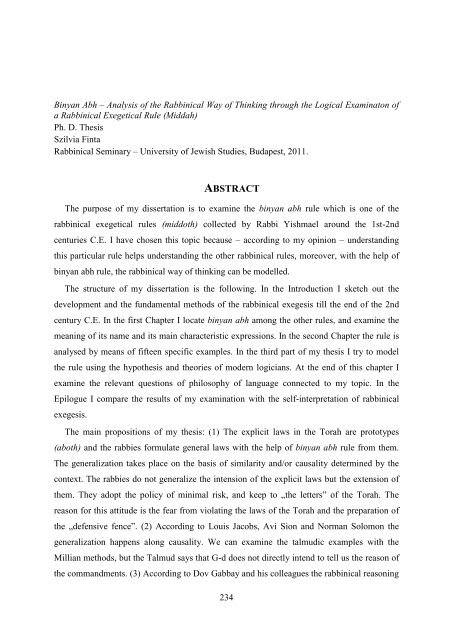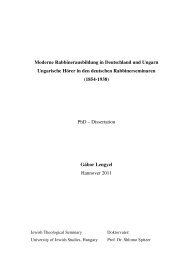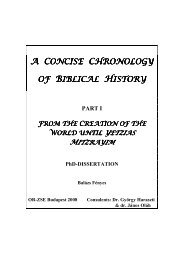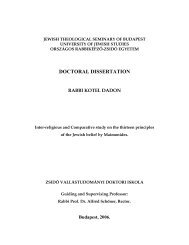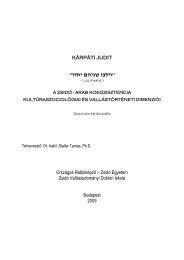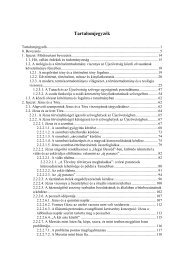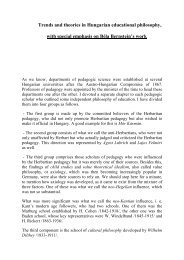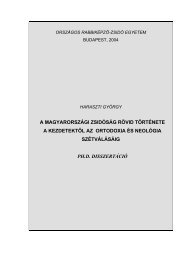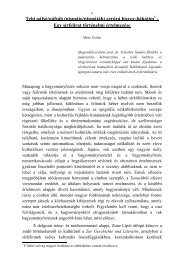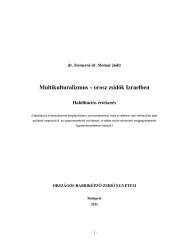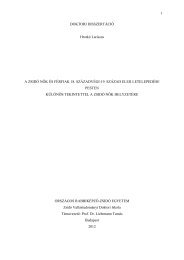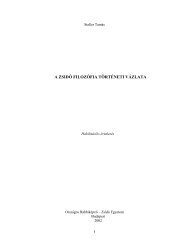Binján áv - A rabbinikus gondolkodásmód analÃzise egy ... - Or-Zse
Binján áv - A rabbinikus gondolkodásmód analÃzise egy ... - Or-Zse
Binján áv - A rabbinikus gondolkodásmód analÃzise egy ... - Or-Zse
You also want an ePaper? Increase the reach of your titles
YUMPU automatically turns print PDFs into web optimized ePapers that Google loves.
ABSTRACT<br />
Binyan Abh – Analysis of the Rabbinical Way of Thinking through the Logical Examinaton of<br />
a Rabbinical Exegetical Rule (Middah)<br />
Ph. D. Thesis<br />
Szilvia Finta<br />
Rabbinical Seminary – University of Jewish Studies, Budapest, 2011.<br />
ABSTRACT<br />
The purpose of my dissertation is to examine the binyan abh rule which is one of the<br />
rabbinical exegetical rules (middoth) collected by Rabbi Yishmael around the 1st-2nd<br />
centuries C.E. I have chosen this topic because – according to my opinion – understanding<br />
this particular rule helps understanding the other rabbinical rules, moreover, with the help of<br />
binyan abh rule, the rabbinical way of thinking can be modelled.<br />
The structure of my dissertation is the following. In the Introduction I sketch out the<br />
development and the fundamental methods of the rabbinical exegesis till the end of the 2nd<br />
century C.E. In the first Chapter I locate binyan abh among the other rules, and examine the<br />
meaning of its name and its main characteristic expressions. In the second Chapter the rule is<br />
analysed by means of fifteen specific examples. In the third part of my thesis I try to model<br />
the rule using the hypothesis and theories of modern logicians. At the end of this chapter I<br />
examine the relevant questions of philosophy of language connected to my topic. In the<br />
Epilogue I compare the results of my examination with the self-interpretation of rabbinical<br />
exegesis.<br />
The main propositions of my thesis: (1) The explicit laws in the Torah are prototypes<br />
(aboth) and the rabbies formulate general laws with the help of binyan abh rule from them.<br />
The generalization takes place on the basis of similarity and/or causality determined by the<br />
context. The rabbies do not generalize the intension of the explicit laws but the extension of<br />
them. They adopt the policy of minimal risk, and keep to „the letters” of the Torah. The<br />
reason for this attitude is the fear from violating the laws of the Torah and the preparation of<br />
the „defensive fence”. (2) According to Louis Jacobs, Avi Sion and Norman Solomon the<br />
generalization happens along causality. We can examine the talmudic examples with the<br />
Millian methods, but the Talmud says that G-d does not directly intend to tell us the reason of<br />
the commandments. (3) According to Dov Gabbay and his colleagues the rabbinical reasoning<br />
234


